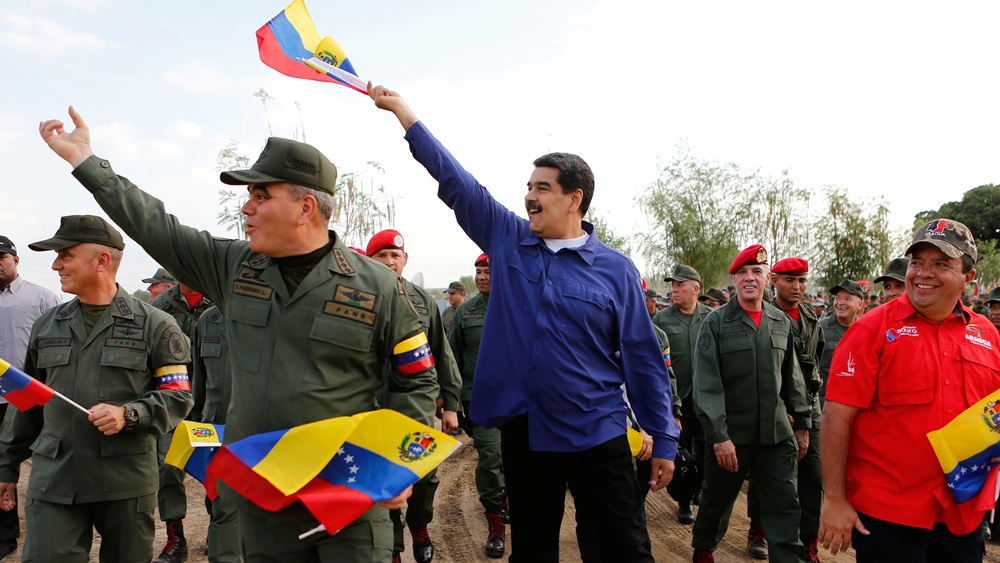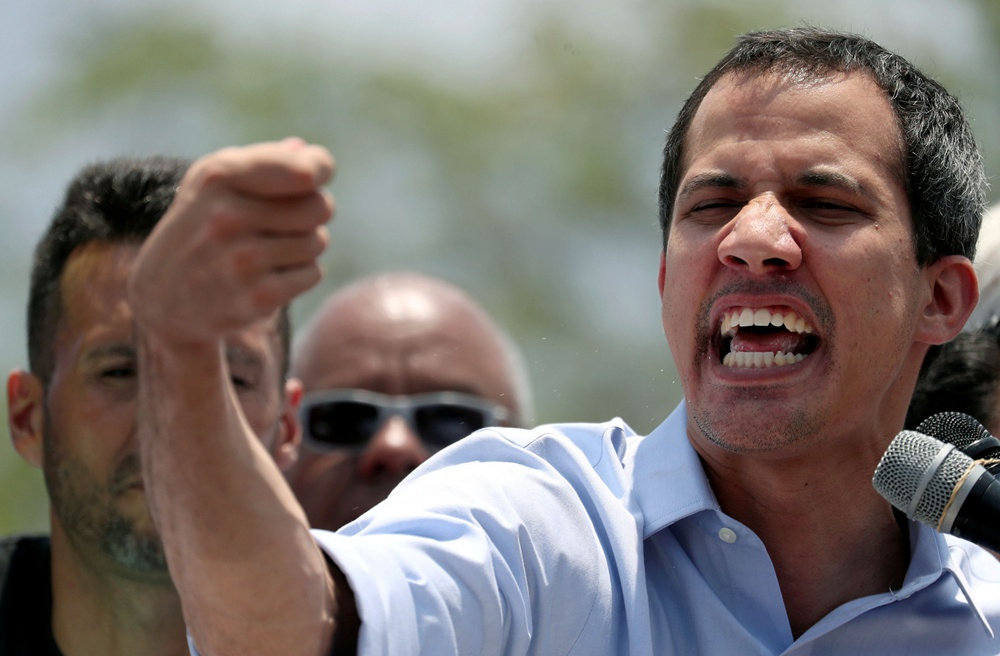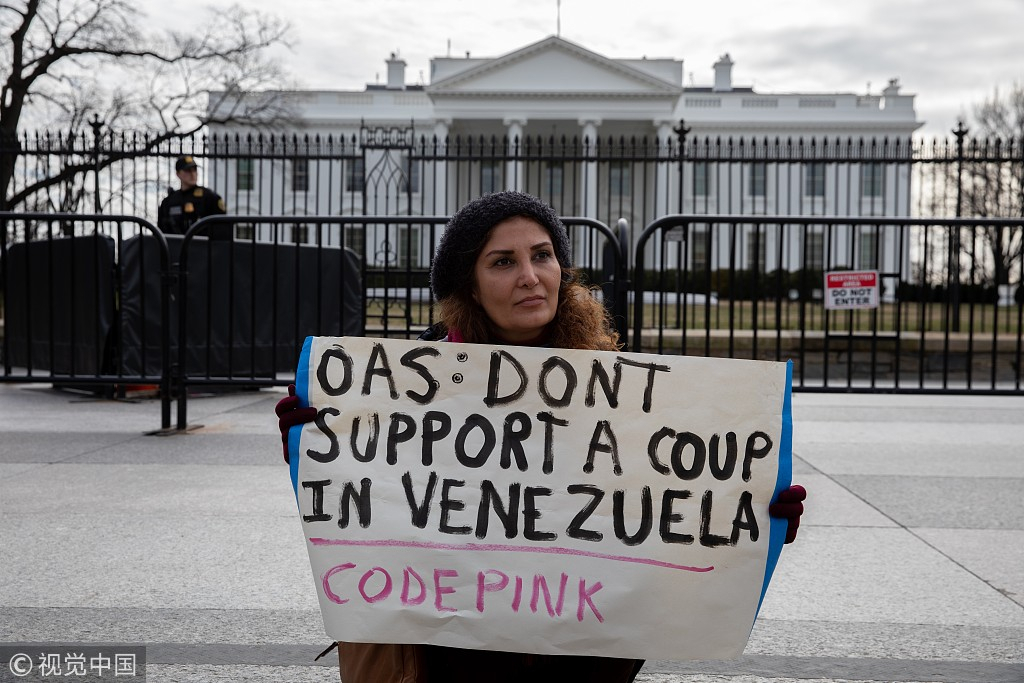
Opinion
19:57, 21-May-2019
Patience is needed in Venezuela's reconciliation
Updated
22:06, 21-May-2019
Pan Deng

Editor's Note: Pan Deng is a member of the Academic Committee at the Charhar Institute and executive director of the Latin America and Caribbean Region Law Center of China University of Political Science and Law. The article reflects the author's opinion, and not necessarily the views of CGTN.
Venezuela, which was at an explosive point several days ago, has seen a mild turnaround. The "major" U.S.-led actions that Venezuelan opposition leader Juan Guaido threatened earlier turned out to be the arrest of four pro-Maduro activists on May 16.
However, the action did not stay under the spotlight for too long as attention turned to the ensuing multi-level dialogue and consultations among concerned parties.
From a Putin-Trump phone call to the face-to-face showdown between U.S. State Secretary Mike Pompeo and Russian Foreign Minister Sergei Lavrov, Russia and the United States have been at loggerheads over the Venezuelan issue for more than 200 days.
After a series of "big moves," the two countries are finally willing to sit down and talk.
Venezuelan President Nicolas Maduro met representatives of the International Contact Group (ICG) and from Uruguay in the presidential palace last week. Previously, the vast majority of this EU-led group, save Italy, refused to recognize Maduro as the constitutional president, while Maduro has flatly rejected solutions proposed by the ICG.
Last week's meeting means that both sides have made great concessions. On the same day in Oslo, representatives of the Venezuelan government and the opposition accepted Norway's mediation. The two sides openly admitted having direct conversations with each other, according to media reports.

Venezuelan opposition leader Juan Guaido speaks at a rally against the government of Venezuela's President Nicolas Maduro in Guatire, Venezuela, May 18, 2019. /Reuters Photo
Venezuelan opposition leader Juan Guaido speaks at a rally against the government of Venezuela's President Nicolas Maduro in Guatire, Venezuela, May 18, 2019. /Reuters Photo
Maduro has been calling for talks with the opposition for some time, but there was no positive response. As the door to dialogue opens, the international community is seeing a glimpse of hope for the final resolution of the crisis.
Four months ago, on January 23 when the self-proclaimed leader of the National Assembly Juan Guaido declared himself interim president, he quickly received recognition from more than 50 countries including the United States and those in Europe and Latin America.
Many observers believed that without "international recognition," the Maduro administration will cede power as a result of a lack of "legitimacy of governance." A regime change in Venezuela thus appeared inevitable as Maduro's administration suffered from a series of economic sanctions, diplomatic isolation and political interference from other countries.
It seemed that attempts by Guaido to "break the camel's back with a final straw" were carried out frequently, but ineffectively, be it the "humanitarian aid standoff" at the Venezuela-Colombia border in February, the sabotage attack that caused massive power outage in March, or the "Operation Liberty," "Operation Freedom" and the "End of the Usurpation" campaigns launched by Guaido in April.
After four months of drama, the "parallel government" has not fundamentally undermined the Maduro government, which is still in firm control of the situation in Venezuela. In contrast, the opposition has been widely questioned by its supporters both at home and abroad after so many botched operations.
This was especially true in April when Guaido caused widespread resentment among Venezuelans by openly claiming to seek foreign military intervention after a failed coup.
Now all sides have come to their senses.
Venezuela has been plagued by deteriorating quality of life, a collapsed economy and soaring hyperinflation in recent years. It is true that those in power are to blame.

A woman holds a placard in support of Venezuela's President Nicolas Maduro in front of the White House in Washington, January 26, 2019. /VCG Photo
A woman holds a placard in support of Venezuela's President Nicolas Maduro in front of the White House in Washington, January 26, 2019. /VCG Photo
However, after venting their grievances, the public came to a sensible realization that the current predicament is an inevitable result of the decade-long journey on a wrong development trajectory, which cannot be easily reversed by changing a president or a government.
The international community has gradually woken up to the fact that Maduro cannot be forced out of power by threats.
The political and social crisis of Venezuela is rooted in its own economic imbalance and stagnation of production. Both the government and the opposition recognize the need for change, but it is the people of this country that are responsible for discussing and figuring out "how to change."
In the past, some well-meaning people tried to accelerate the process through "promoting change," which now turns out to be a less-than-suitable option considering Venezuela's national realities. Therefore, the ongoing effort to "seek changes" through "promoting talks" should be the preferred path going forward.
Both sides' willingness to negotiate is a result of the joint efforts by the international community. It is also a wise choice that the Venezuelan people have made after four months of chaos.
However, there are still many complex factors from home and abroad, including the deeply ingrained rivalry between the government and the opposition and many fragmented political factions in Venezuela.
Predictably, the ongoing dialogue is of a long-term nature, and it is unrealistic to expect results after one or two rounds of talks. We cannot rule out the possibility of one side trying to gain leverage over the other by creating pressure or provoking a "war" during the negotiation process.
If one side attempts to speed up the process by setting up "preconditions" and "timetables," it will only push the situation back to the previous state of crisis, chaos and impasse. Time and patience are needed to address the ongoing crisis.
(Cover Photo: Venezuela's President Nicolas Maduro gestures next to Defense Minister Vladimir Padrino Lopez, during a ceremony at a military base in Maracay, Venezuela, May 17, 2019. /Reuters Photo)
(If you want to contribute and have specific expertise, please contact us at opinions@cgtn.com.)

SITEMAP
Copyright © 2018 CGTN. Beijing ICP prepared NO.16065310-3
Copyright © 2018 CGTN. Beijing ICP prepared NO.16065310-3